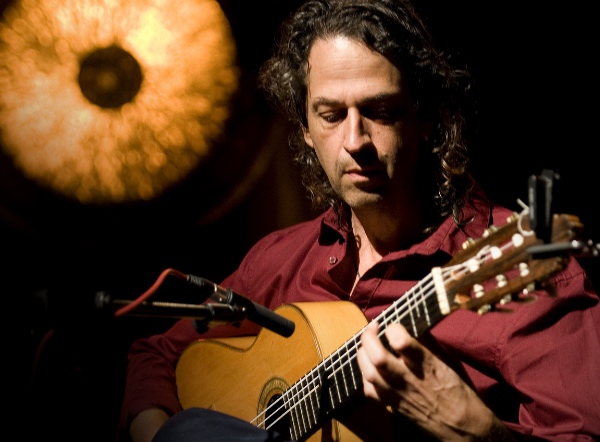
Itamar’s music blends the delicateness of Middle Eastern music, the freedom found in jazz and the passion of flamenco, creating a unique sound all his own. Recipient of the 2014 ACUM Prize for Special Achievement in Jazz and the prestigious 2014 Landau Prize, Itamar Erez is an internationally renowned composer and guitarist who has shared the stage with such musicians as Omar Faruk Tekbilek, Tomatito, Avishai Cohen, Jean-Louis Matinier, Zohar Fresco, and others. Itamar has released two CDs with his quartet The Adama Ensemble, “Desert Song” (2006) and “Hommage” (2010). His most recent release, “New Dawn” (2013), is a duet collaboration with Yshai Afterman (percussion), with special guest Antonio Serrano (harmonica). Itamar performs internationally and gives workshops and masterclasses, teaching his unique approach to music and guitar playing. During 2014-15, Itamar performed in Canada, USA, Germany, Netherlands, Austria, Cyprus, Israel, India, Tunisia and Colombia. Upcoming performances will be at the “Rogue Folk Club” & Vancouver International Guitar Festival (Vancouver BC), as well as at Carnegie Hall (NY), Drom (NYC) and Toronto’s Small World Centre April 2018. Itamar is currently working on new material for his next CD, and is on the guitar faculty at the Vancouver Symphony Orchestra School Of Music. His new book “Exercises & Etudes, an Advanced Method for the Fingerstyle Guitarist” was released March 2016.
Migrant Voices《聲之旅》(2019) – Itamar Erez
commissioned by the Sound of Dragon Ensemble, with the assistance of the Canada Council for the Arts
“I remember reading Italo Calvino’s (1923-1985) fantastic book “Invisible Cities” (1972) many years ago. It is an imagined set of conversations between the famous traveler, Marco Polo, and the emperor of the 13th century Mongolian empire, Kublai Khan. Each chapter of the book is a prose poem, describing in amazing detail an imaginary city that Marco Polo ”discovered” in his travels, and I remember being deeply inspired by it as a young person. In a similar way perhaps, the music of “Migrant Voices” is a kind of a “discovered” folk song, from an imaginary city, country or culture. Based on a 9/8 + 7/8 time signature, it definitely has elements taken from certain Balkan/Greek music, Turkish or Armenian. Not sure, to tell you the truth, exactly why and how- it just came to me one day as if a voice whispered it in my ear”. ~ Erez
出生於古巴、成長於義大利的近代作家 Italo Calvino 的著名小說「隱形的城市」為此曲的靈感來源。作者想像著馬可波羅遇見13世紀蒙古大汗,對他鉅細靡遺的描述了一個個遊歷過的城市,但是書中描述的是作者想像中的虛擬城市。同樣的,作曲家透過自己的想像,創作出一個虛擬國度裡的音樂,富有巴爾幹半島、希臘、土耳其等地色彩,動人的旋律建構在9拍子與7拍子節奏的交替進行中。
Rikkud – Itamar Erez
Developed from the last movement of the composer’s own Piano Trio, this is playful and rhythmic, based on a simple downward moving pentatonic phrase. Erez describes the piece as a kind of a chaotic/ecstatic dance, with some moments of relief, until the very exhausting end.
